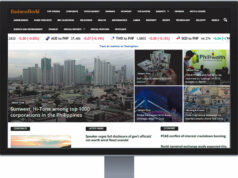Assessing the technological shifts driving the future workplace
By Adrian Paul B. Conoza, Special Features Writer
Changes in the workplace have been more imminent than before with the arrival of new technologies and a new work force.
Automation and artificial intelligence (AI) are seen to benefit businesses and the economy for their ability to increase labor and capital productivity in workplaces by taking over mundane tasks and orienting employees towards core business processes.
At the same time, technologies are getting more involved at work, a new work force is being assembled as Generation Z (Gen Z) are beginning their careers, bringing along a different set of skills, ideas, and attitudes to workplaces as they blend in with older generations.

These ways in which work is currently being shaped were further explored in the first session of this year’s BusinessWorld Economic Forum held on May 30 at the Grand Hyatt Manila in Taguig City.
Comprising the session’s panel are women leaders who shared their certain expertise revolving around the theme “Automation & Artificial Intelligence and How They Will Impact People, Skills and Management”: Kristine Romano, managing partner for Philippines of McKinsey & Company; Rizalina Mantaring, president of the Management Association of the Philippines (MAP); Susie Lee, vice-president of Global Business Solutions at educational technology company Degreed; and Pauline Fermin, managing director of Acumen Strategic Consulting, Inc.
Ms. Romano started the session by sharing a recent study by McKinsey & Company about “Workforce Transition in a Time of Automation.” She emphasized that while AI and automation have created significant value and are being felt in certain industries, they will not replace human beings. They will rather change the way people work.

Managing Partner, Philippines,
Mckinsey & Company
One of the findings of the study, which Ms. Romano highlighted, is that on average 6 out of 10 jobs, at least 30% of their activities can be automated.
With this potential in automation technologies, more advanced capabilities will be required of future workers. She added that while skills evolving around physical capability and sensory perception are replaceable, cognitive capabilities are not yet fully automatable by existing technology.
Another point of Ms. Romano’s talk is that the question of AI and automation taking over the workplace is always when. How quickly this occurs depends on many underlying societal factors such as feasibility, cost of developing and deploying solutions, labor market dynamics, economic benefits, and regulatory and social acceptance.
Moreover, she described the impact of AI and automation as taking place “gradually, then suddenly.”
“In the future, we don’t really feel it, but once it accelerates, everybody’s going to start doing it. That’s why the imperative for all of us is we have to start today,” she concluded.

This technological change apparent in work pushes for a change in leadership and management as well, as the second speaker, Ms. Mantaring, pointed out.
MAP’s Ms. Mantaring, who is also the chairman of Sun Life Financial Philippine Holding Co., Inc., first explained the place of machines inside and outside the workplace. She observed that machines are replacing humans, from the automation of factories to the employment of “intelligent agents” in a call center.
Moreover, she said that machines are making humans better, as exemplified in doctors assisted with AI and machine-aided operation. It is also changing business models, such as in the insurance industry, where risk modeling of actuaries have become real-time and risk rating more accurate.
This technologically developing environment, which Ms. Mantaring regards as “the age of super machines,” calls for upgraded management. “Because we have super machines, we need super managers,” she said.
According to Ms. Mantaring, the super manager is a creative innovator, who envisions the future and sees possibilities. They are also empathetic mentors who can guide employees in their career. These managers should be equipped with complex problem solving, critical thinking, creativity, and people management skills.

The third speaker, Ms. Lee of Degreed, centered her presentation on the rising importance of skills in the future.
“Your role as [leaders] is really about how you would ensure the enablement of your people so that you have the right skills in your organization to help drive that transformation,” she said.
Ms. Lee emphasized that learning does not drive business, but skills do. At a time when things like skills are getting hard to predict, organizations need to be agile and to stay relevant.
“We need to prepare for the future of work and the skills that we need,” she said.
Ms. Lee also called for leaders to prepare their organizations to build high-demand skills. These skills fall under power skills (e.g.: creativity, empathy, collaboration) and technical skills (e.g.: cloud computing, digital literacy).
She encouraged leaders to challenge outdated strategies and to get the right technology to upscale organizations.

managing director, Acumen Strategic Consulting, Inc.
Completing the first session was Ms. Fermin of Acumen, with insights about who the Gen Z are, especially in light of their increasing entry into the work force.
“The Gen Z’s experience of the world is fundamentally different from other generations, thus making their mind-set different as well,” she said of the profile of the generation that is entering the work force.
This difference in mind-set is manifested in three ways. First, digital media and the Internet are fully integrated with their experience of the world and how they define being. Second, they are “highly in touch with everything that’s happening in their lives in a world that is expansive and has no borders”, and as a result they take action on whatever happens within them and utilize available channels in order to make their voices heard.
Third, Gen Z find their own anchor in purpose and authenticity. “They seek meaning beyond what’s in the surface. They’re disillusioned when it comes to false information,” Ms. Fermin further explained. “They want to see organizations, brands, leaders, and people who clearly articulate their purpose and consistently live them out in ways they can understand.”
Given this distinct mind-set of Gen Z, Ms. Fermin recommended leaders to respond by communicating, teaching, and coaching them in a way that effectively builds needed capabilities.
She also noted that there must be intergeneration understanding within organizations as Gen Z’s will intersect with previous generations at work.
On the other hand, businesses “must be digitally-enabled and workflows should be reconfigured” to draw Gen Zs. They should also support a work-life balance within Gen Z talents in order to retain them. Finally, they are encouraged to build authentic brands built upon transparency and commitment not only to attract but also to retain and engage Gen Zs.



